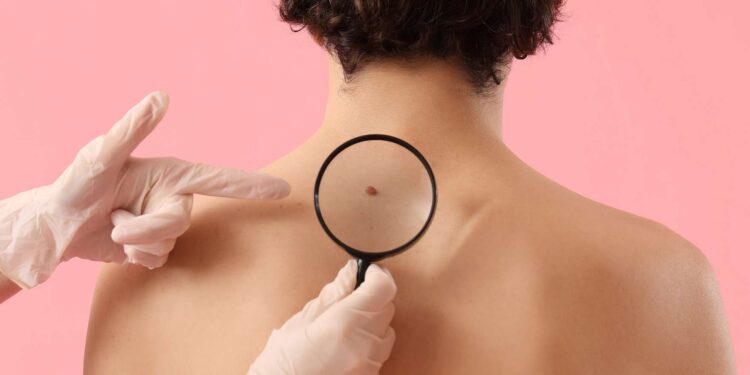How to improve skin cancer screening? In a context of shortage of dermatologists in France, cutting-edge technologies combined with artificial intelligence could prove to be increasingly valuable diagnostic aids.
Since October, in Evreux, a town located about a hundred kilometers west of Paris, an immense machine, three meters high and five meters wide, has been enthroned. Called Vectra 360, it is capable of photographing almost the entire surface of a patient’s skin in one shot, thanks to its 92 high-definition lenses.
The resulting scanner maps the visible lesions and all the molesmoles : “ The doctor can then, remotely, choose to enlarge one that seems suspicious to analyze it. », explains Isabelle L’Hôpital, who manages the company France Dermatologie Territoires, at the origin of the project. The objective of this dermatological imaging sector is to improve the detection of melanoma in a department which faces, like many others, ” long delays in obtaining an appointment with a dermatologist » against a backdrop of shortage of these specialists.
Melanoma, responsible for 2,000 deaths each year in France
Each year in France, around 18,000 cases of melanoma – the most aggressive of skin cancers – are discovered, causing 2,000 deaths. It is a skin tumor that resembles a mole, but often has the following characteristics: asymmetry, irregular edges, multiple colorscolors, magnification or change in appearance. The number of new cases per year has seen a steady increase over the past two to three decades. But thanks to improved screening and the introduction of new treatments, the death rate has tended to stabilize in recent years.
Several manufacturers are trying to revolutionize the early treatment of this serious cancer. “ Since the end of the 1990s, many practices have been equipped with so-called dermoscopy machines. digitaldigitalwhich allow you to take photos of a patient’s skin and then compare them during successive appointments to see if the moles have evolved », Tells AFP Luc Thomas, specialist in skin cancersskin cancers, practitioner at Lyon University Hospital. In France, the German FotoFinder has established itself among dermatologists, but technologies are evolving: the quality of images has clearly improved. Previously capable of photographing skin cm² by cm², machines can now capture almost the entire body surface. The French startup SquareMind hopes to market its “innovative” solution this year: an arm robotrobot which navigates around the patient. “ In just a few minutes it will offer photographyphotography of the whole body, zoomable on the lesions up to very high definition », Tells AFP Ali Khachlouf, founder of SquareMind.
Help with “sorting” thanks to AI
In Marseille, in the south of France, the Marseille university hospitals were equipped in 2022 with the Vectra system, manufactured in the United States. The machine, which costs around 400,000 euros, was financed thanks to the help of industrialists and the Cancéropole de PACA. “ We must use technology to improve our practices », argues Jilliana Monnier, oncodermatologist, head of the automated melanoma screening center in Marseille, who uses it. “ At a time when dermatological supply is shrinking, automating certain time-consuming steps in melanoma screening will make it possible to more precisely monitor patients who need it most. “, she explains.
Secondly, practitioners hope to be able to count on the help of artificial intelligence, produced by these machines. By automatically documenting the skin surface of a large number of people, they will make it possible to create a complete history of these patients’ lesions and moles. The objective will then be to develop AI algorithms capable of easily and quickly identifying new, progressive or suspicious lesions on the skin as a whole. “ Today, the machine cannot yet give a diagnosis », specifies Jilliana Monnier – that is to say, affirming whether this or that lesion is a melanoma. But within two years, Ali Khachlouf expects an AI that detects melanoma “ with a high level of confidence », and Luc Thomas specifies that “ L’artificial intelligenceartificial intelligence can be used to sort things out, even if the final decision will always be made by the doctor “.



